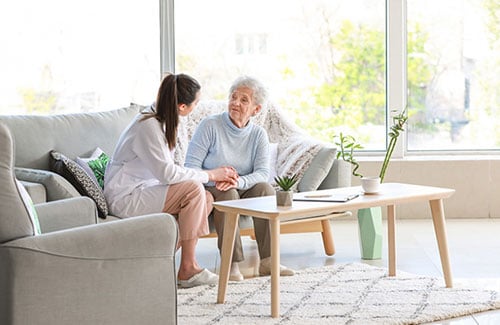Caring for Your Mental Health After Cancer

The Residual Social and Emotional Fallout of Cancer
In big ways or small, it’s safe to say that every cancer survivor has experienced a whirlwind of emotions, including shock, disbelief, fear, and anger. While some people experience a simultaneous improvement in their physical and emotional health, others need more time. For them, beating the disease physically is just one step in a long journey toward recovery because oftentimes, emotional wounds take much longer to heal than physical ones.
Emotional Symptoms for Survivors is Normal
Although anyone can be affected by emotions such as anxiety, fear, depression, and social withdrawal, cancer survivors are even more vulnerable. According to an article published in Cancer Today magazine, nine in 100 people experience depression, but among cancer survivors, that rate is tripled to 27 in 100 experiencing depression. Commonly, cancer survivors:
- Mourn the loss of their pre-cancer life, attitude, and outlook
- Feel guilt about beating the disease when others did not
- Worry about cancer recurrence
- Struggle with body image issues and, consequently, become withdrawn socially and intimately
Signs That It May Be Time to Seek Help
It can be hard to know when to get help, but there are some symptoms that indicate it’s time:
- Disinterest in activities you used to enjoy
- Feeling sad, hopeless, afraid, and/or nervous much of the time
- Avoiding friends, family members, and other people or places out of fear
- Feel guilty or like you’re a burden to others
- Crying for no reason at all
- Difficulty sleeping
- The need for constant reassurance from others
At RMCC, we want you to know that you aren’t alone in this. Just as we were there for you during cancer treatment, we are here to help you work through any emotional ups and downs you may face as a survivor. Participating in cancer survivors’ support groups and/or talking to a psychotherapist can help you get your feelings out in the open which, in itself, can be incredibly helpful! We encourage you to talk with your cancer care team about the resources available to you.
In addition to talking with a professional or other survivors, a primary care physician can be an incredibly helpful tool when it comes to struggling with emotional problems. A Cancer Today article noted that 8% of survivors with depression reported they did not have a primary care physician, compared to just 4% of survivors who were not dealing with depression.
If you have a primary care physician, he or she is trained to identify the symptoms of depression and is therefore able to provide you with the proper help. They can also determine if you could benefit from anti-anxiety or antidepressant medications.
Remember, your joy and quality of life is precious, and experiencing social or emotional changes is completely normal. After all, you’ve just been through a monumental physical battle— one in which you fought and won! You needed plenty of help to overcome your physical cancer struggles, so don’t hesitate to enlist help overcoming your emotional cancer struggles too!